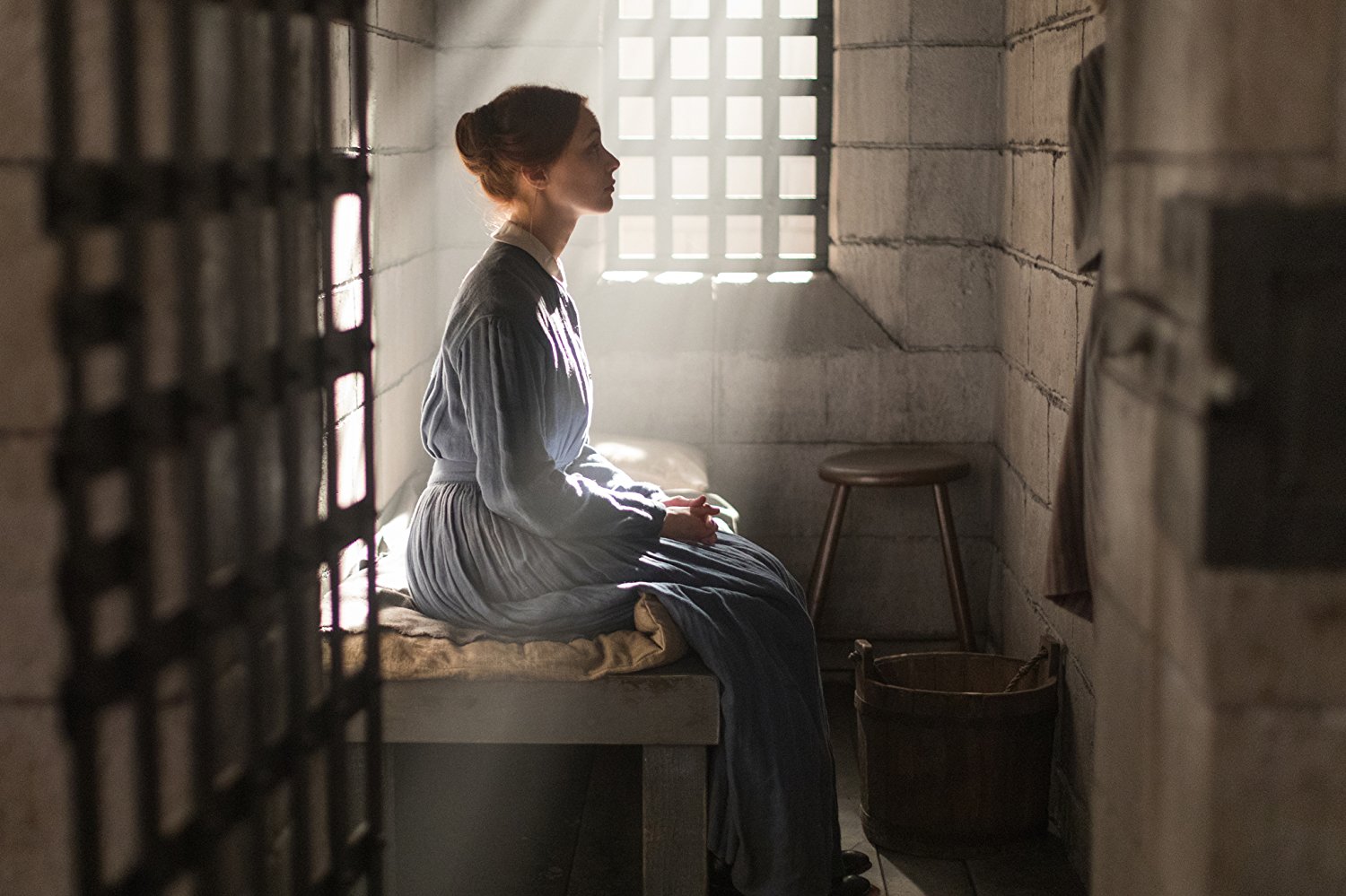Margaret Atwood’s particular brand of dystopian feminism is back in style.
With all the hype surrounding the television adaptation of her most famous novel, The Handmaid’s Tale, another Atwood adaptation has flown pretty much under the radar.
I first read Alias Grace the summer before my senior year of high school, and I was intrigued to discover that a Canadian TV network had adapted it into a miniseries.
Alias Grace, based on a true story, tells the tale of Grace Marks (Sarah Gadon), a “celebrated murderess” convicted of homicide at age 16. When the story begins in the mid-1800s, Grace is 32 and has spent half her life in prison for a crime she has no memory of committing.
An advocacy group hires Dr. Jordan (Edward Holcroft), a psychologist, to examine Grace and prompt her to remember the full story, ultimately with the hopes of writing a report that will exonerate her.
The show alternates from scenes of dialogue between Grace and Dr. Jordan as he questions her to flashbacks of the years and days before the crime.
The most noteworthy aspect of this story is the extreme sexual objectification that Grace suffers throughout her life, but specifically during the whole process of imprisonment and medical examination.
Growing up, Grace’s father was an angry, abusive alcoholic. Once, when she was a young teenager, he placed a lingering kiss on her lips, so she moved out to seek a servant position.
Before she joined the Kinnear household (in which Thomas Kinnear (Paul Gross) and Nancy Montgomery (Anna Paquin) were eventually murdered), Grace worked for the Parkinson family. There, she befriended Mary Whitney (Rebecca Liddiard), a dynamic, defiant girl with revolutionary ideals.
Mary gets pregnant by George Parkinson (Will Bowes), son of the lady of the house. At that time, pregnancy out of wedlock as a servant girl was basically a death sentence. She had two options: have an abortion and suffer severe medical consequences, or face the public shame of carrying the child, lose her reputation and her job, and be thrown out of the house.
When Mary confronted George to ask for more support, he gave her five dollars and tried to convince her that she had tricked him into sex, that he bore no responsibility for the child. Men just moved on to the next when a woman got pregnant.
Mary Whitney died from complications from an illegal abortion, leaving Grace traumatized and friendless.
Then, Grace is persuaded to move to the somewhat disreputable Kinnear household. Mr. Kinnear had a well-known relationship with his head servant, Nancy Montgomery. As such, it was not considered an appropriate home, particularly for a young servant girl.
Mr. Kinnear apparently has a fetish for servant girls, revealed in an unsettling scene between him and Nancy. Kinnear scolds Nancy for being a dirty girl and doing a bad job of cleaning, so he chases her around his bedroom saying he has to punish her while she screams mirthfully.
When Kinnear is away for a night, Nancy persuades Grace to sleep in his bed with her. Although Grace is uncomfortable, Nancy replies that, “even if he did discover it, he’d like the idea of two maidservants in his bed at once.”
Nancy begins to believe that Mr. Kinnear could “move on” to Grace, especially as it is revealed that Nancy is pregnant. Nancy manufactures competition between herself and Grace, feeling threatened, self-conscious about her weight, and jealous of every innocent interaction between Grace and Kinnear.
Grace spends a lonely birthday being cheered up by Jamie Walsh (Stephen Joffe), a farm boy from down the road. They talk and laugh in a secluded field, and she allows him to kiss her on the cheek. When she returns home, crude aspersions are cast upon their innocent encounter. She realizes that a moment she thought was private was actually public and remarks that a girl of 15 or 16 is treated like a woman, while a boy of the same age is treated like a young boy.
James McDermott (Kerr Logan), another household servant who is eventually hanged for the murder of Mr. Kinnear, is coarse and rude. He makes inappropriate sexual remarks and advances toward Grace. He also casts aspersions on Nancy for sleeping with Mr. Kinnear, remarking that “once a colt is broken in, she is fair game for all,” and “a woman does her best work while on her back.”
At the trial, McDermott claims that he committed the murder because Grace persuaded him to do it. He believed that they’d be married after they escaped together. As they are escaping, McDermott tries to rape Grace, covering her mouth as she screams. He blames her by saying she invited him: “you enticed me and caused me to damn my soul in the bargain, forcing me to kill those two.”
She bites him to get him to stop, and he replies, “So you are a good girl after all. I’ll wait until I’ve married you. It’s more proper. I was just testing you.”
During Grace’s murder trial, men gawp at her with sick pleasure and perverted interest, media exploitation parallelling the sexual exploitation she has faced her entire life.
In prison, the guards take liberties, making abusive comments and handling her aggressively. Eventually, they cut off her hair—a common symbol of female sexuality—because she had too many marks against her for talking.
She is also temporarily transferred to an asylum where she is repeatedly sexually assaulted as well. There’s a chilling scene in which she screams and kicks wildly as the doctor runs his hand under her clothes.
Once they hire Dr. Jordan to examine her, he tries to penetrate her mind and unearth what’s beneath. Everyone wants to know the details of the murder, so he tries to force himself gradually under her defenses, to get her to give up what’s desired.
Dr. Jordan even finds himself having sexual fantasies about Grace. Disturbed, he talks to Grace’s lawyer for insight. The lawyer predicts that maybe Grace is in love with Jordan. The lawyer claims Grace was also besotted with him, describing the temptation he faced from the young, vulnerable girl.
Jordan has reactionary, almost violent sex with his landlady, saying he “always wanted to do that with someone, not with you.” He was clearly imagining aggressively penetrating Grace, frustrated because he wasn’t having success penetrating her mind.
In the most interesting and telling scene, Dr. Jordan wonders, “Do hypnotism & mesmerism provide an opportunity for women to say what they think, and to express their true thoughts and feelings more boldly and in more vulgar terms than they could otherwise feel permission to? I wonder about Grace’s violent childhood and her experience as a young woman, abused constantly, harassed on every side. I wonder how much repressed rage she must have carried with her as a result. The question is, was this rage directed toward Nancy Montgomery and Thomas Kinnear, resulting in their murder?”
Everyone loves a scandal, and the media knows that sex sells. Grace’s story is sensationalized, sexualized, judged, and scrutinized. Everyone wants to know everything about the 16-year-old murderess; they wanted to violate her all over again.
At the end of the story, Grace comments on such exploitation, saying that Dr. Jordan was “as eager as Mr. Walsh to hear about my sufferings in life. Your cheeks would flush, and if you’d had ears like a dog, they would have been pricked forward, with your eyes shining and your tongue hanging out, as if you’d found a grouse in a bush.” She knows that the men in her life like to get off on the lurid details of all the sufferings she has endured.
Grace reveals that she always knew about their perverted desire, that she may have changed some of the details of her stories to suit what she thought they wanted to hear.
This whole series tells the story of sexual excavation, of female violation, of extreme and repeated objectification. It feels like female sexuality itself is on trial in this case, an elusive, mysterious, romantic, alluring thing that everyone wants to look at, but no one wants to touch. Or, rather, everyone wants to touch and some do but just can’t because it’s forbidden, and isn’t that what’s oh-so-sexy about it?
In the end, Grace ends up on top. Is she a murderess? Did she lie about her relationships with McDermott, Kinnear, and Walsh? Does it matter if she did? Who is the real Grace Marks? Some things aren’t for everyone to know. Some things are to remain hidden, unviolated, undiscovered.






Feminism doesn’t make a sense!
The quilt tells you who she is….. The abused and insane maiden trapped in a mans asylum in a yellow flowered night dress, the poor neglected motherless child with no protections or comforts to guide her to safety in the scarf that was used badly and then lost, the guilt ridden churches version of a whore that must pay for her own exploitations in a pink dress, and the blood red petticoat murderess who finally seeks revenge on those that use her up and thrown her away like trash. As Jerimiah told her you are one of us as he pointed to his eyes, like her mother she was able to foresee but not change her future, because of her past she let in their trapped angry souls to not be so a lone in a harsh uncaring unloving world with out windows to escape like her fathers hovel , the maids cold attic, the ship steerage, Nancy’s cellar, the asylum, and the penitentiary. “We are all here together” she tells the doctor in her letter as she admires her own tree of paradise quilt in her own garden.